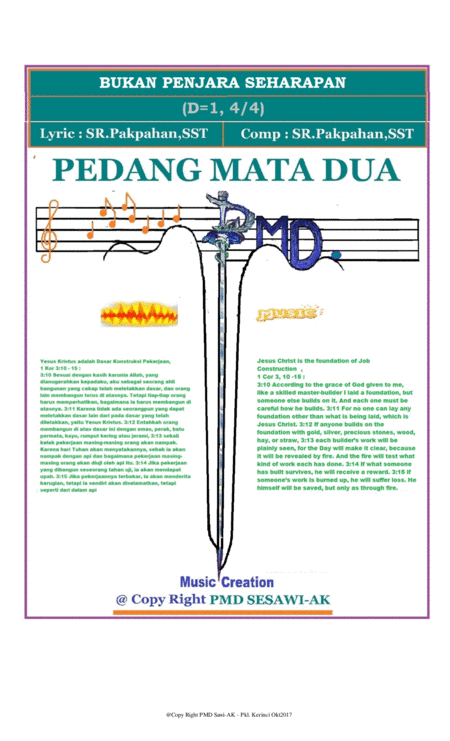Large Ensemble Bass Guitar,Cello,Drums,Glockenspiel,Harmonica,Harp,Piano,Trumpet,Viola,Violin,Voice - Level 5 - Digital Download SKU: A0.990761 Composed by SR.Pakpahan,SST. Arranged by Liric : SR.Pakpahan,SST. Contemporary,Musical/Show,New Age,Pop,Sacred. Score and parts. 63 pages. SR.Pakpahan,SST #5213461. Published by SR.Pakpahan,SST (A0.990761). Solo Pop Song of SACRED MUSIC.A Song for COMPOSITION COMPETITION SMPPRESS Contest 2020.Yesus Kristus sebagai Dasar Konstruksi Pekerjaan,(1 Kor 3:10 - 15)3:10 Sesuai dengan kasih karunia Allah, yang dianugerahkan kepadaku, aku sebagai seorang ahli bangunan yang cakap telah meletakkan dasar, dan orang lain membangun terus di atasnya. Tetapi tiap-tiap orang harus memperhatikan, bagaimana ia harus membangun di atasnya. 3:11 Karena tidak ada seorangpun yang dapat meletakkan dasar lain dari pada dasar yang telah diletakkan, yaitu Yesus Kristus. 3:12 Entahkah orang membangun di atas dasar ini dengan emas, perak, batu permata, kayu, rumput kering atau jerami, 3:13 sekali kelak pekerjaan masing-masing orang akan nampak. Karena hari Tuhan akan menyatakannya, sebab ia akan nampak dengan api dan bagaimana pekerjaan masing-masing orang akan diuji oleh api itu. 3:14 Jika pekerjaan yang dibangun seseorang tahan uji, ia akan mendapat upah. 3:15 Jika pekerjaannya terbakar, ia akan menderita kerugian, tetapi ia sendiri akan diselamatkan, tetapi seperti dari dalam api.Jesus Christ as the foundation of Job Construction,(1 Cor 3, 10 -15}:3:10 According to the grace of God given to me, like a skilled master-builder I laid a foundation, but someone else builds on it. And each one must be careful how he builds. 3:11 For no one can lay any foundation other than what is being laid, which is Jesus Christ. 3:12 If anyone builds on the foundation with gold, silver, precious stones, wood, hay, or straw, 3:13 each builder’s work will be plainly seen, for the Day will make it clear, because it will be revealed by fire. And the fire will test what kind of work each has done. 3:14 If what someone has built survives, he will receive a reward. 3:15 If someone’s work is burned up, he will suffer loss. He himself will be saved, but only as through fire.
